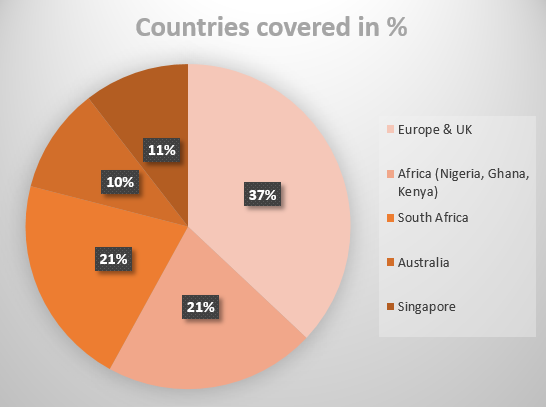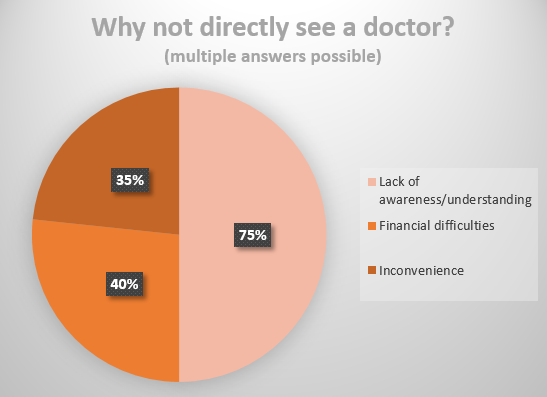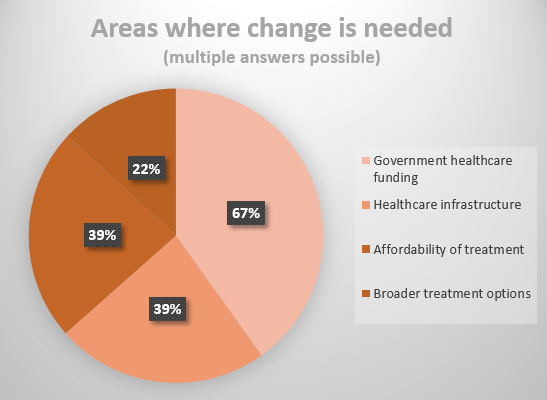Involving Patient Associations EARLY ON really can make the difference
The pharmaceutical industry is engaging with patients more than ever before as companies realise the importance of the patient perspective for everything from clinical trial design to beyond-the-pill services. Patient engagement at a very early stage of drug development is now widely recommended and more commonly practiced. But what do patients think could be improved overall in the healthcare sector? We conducted a survey among patient associations around the world about the availability of needed drugs, the perceived knowledge and skill levels of doctors, and the behaviour and mindset of patients. In this report we reveal what they said.

We need to spread the word
Almost all diseases benefit from early diagnosis and treatment. But of course, it is not as easy as that. Our survey suggests that people delay before contacting a doctor. Although seeing one ranks first in the list of contacts for patients with health issues, they are closely followed by searching for online information and talking to family members or friends.
While there’s no question every disease area is fighting for the public’s attention, and some countries have better infrastructures for awareness and education than others, it suggests we need to focus heavily on raising awareness to drive diagnoses. Financial difficulties are ranked second, directly followed by the strain to find the right doctor to diagnose the condition. This particularly applies to rarer conditions, as it might take years to gain a correct diagnosis and ultimately being referred to the appropriate specialist.
Even when patients do see a healthcare professional, it does not always mean a quick diagnosis. In many countries, basic diagnostic equipment such as x-ray machines are scarce. But there is also a concern among many patients that primary care practitioners are not fully trained about their specific condition, or are able to refer quickly enough. 45% of respondents said that the reason for a delayed or sub-optimal diagnosis was limited medical knowledge of doctors, and 30% named the lack of experienced specialists.
The role of pharma brands and low prority of original drugs
When doctors decide on the best treatment option, they rely on their own experience, discussions with colleagues and medical guidelines and known best practices. 60% of our respondents think that doctors have no preference for branded, original drugs. This number goes up to 75% when it comes to the patients.
Unfortunatley, the ability of doctors to communicate treatment choices and decisions to patients is rated ‘very low to average’ by 80% of the respondents.
Therefore, even if a patient goes see a doctor, is referred to the right specialist and receives the appropriate treatment, they still may not follow the treatment plan correctly. Patient associations believe the main reason for this is inadequate communication from doctors to patients e.g. on treatment instructions or on side effect information. Other reasons that came up were financial difficulties and personal beliefs or attitudes of the patients.
Which changes are needed, and who can drive them?
The most important groups to implement these changes are national governments and ministries of health, health insurance companies / national health services, patient associations themselves, hospital management and pharmaceutical companies.
If the vicious circle of low coverage and no special funding by health insurance programs, especially for rare diseases, and therefore low availability of pharmaceutical products continues, significant change will not easily happen.
Involving patient associations early on creates value
Patient associations can play an important role in promoting disease awareness and demonstrating the burden of a disease for patients and their families, who need to be better supported in their role.
They know what the unmet needs and expectations of patients are, and can help pharma companies to make informed medical research decisions and establish their priorities. They can even help pharmaceutical companies by co-developing patient services such as patient hotlines, support programs, etc. And if they are involved early enough, patient associations can also help in determining clinical outcomes that matter most to patients and designing patient-friendly clinical trials.
All of the above results in improved drug development which is more focussed, potentially costs less, and most importantly leads to drugs that actually have a market because they really serve an unmet patient need.
If you would like to discuss how to best engage with patients early on, simply get in touch!












